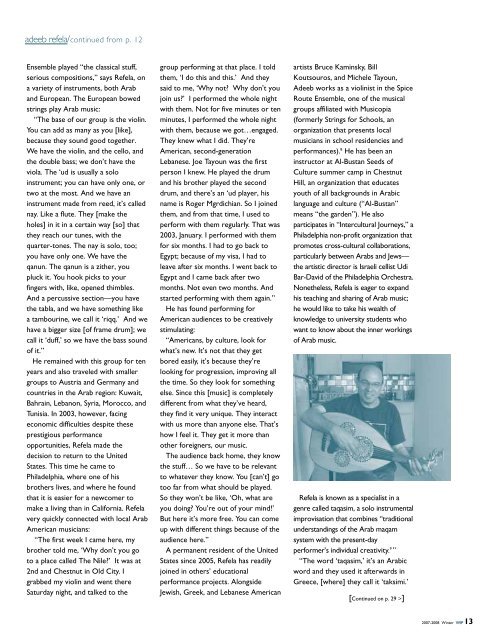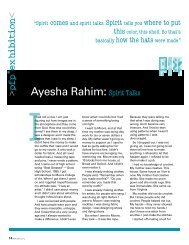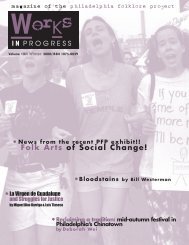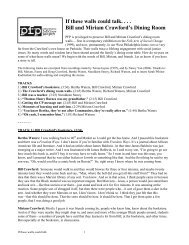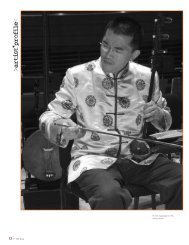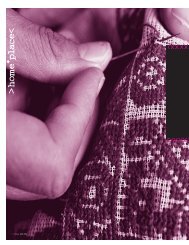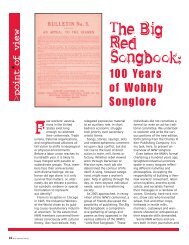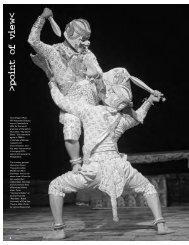African song / Fatu Gayflor ⢠War and wealth - Philadelphia Folklore ...
African song / Fatu Gayflor ⢠War and wealth - Philadelphia Folklore ...
African song / Fatu Gayflor ⢠War and wealth - Philadelphia Folklore ...
Create successful ePaper yourself
Turn your PDF publications into a flip-book with our unique Google optimized e-Paper software.
adeeb refela/continued from p. 12<br />
Ensemble played “the classical stuff,<br />
serious compositions,” says Refela, on<br />
a variety of instruments, both Arab<br />
<strong>and</strong> European. The European bowed<br />
strings play Arab music:<br />
“The base of our group is the violin.<br />
You can add as many as you [like],<br />
because they sound good together.<br />
We have the violin, <strong>and</strong> the cello, <strong>and</strong><br />
the double bass; we don’t have the<br />
viola. The ‘ud is usually a solo<br />
instrument; you can have only one, or<br />
two at the most. And we have an<br />
instrument made from reed, it’s called<br />
nay. Like a flute. They [make the<br />
holes] in it in a certain way [so] that<br />
they reach our tunes, with the<br />
quarter-tones. The nay is solo, too;<br />
you have only one. We have the<br />
qanun. The qanun is a zither, you<br />
pluck it. You hook picks to your<br />
fingers with, like, opened thimbles.<br />
And a percussive section—you have<br />
the tabla, <strong>and</strong> we have something like<br />
a tambourine, we call it ‘riqq.’ And we<br />
have a bigger size [of frame drum]; we<br />
call it ‘duff,’ so we have the bass sound<br />
of it.”<br />
He remained with this group for ten<br />
years <strong>and</strong> also traveled with smaller<br />
groups to Austria <strong>and</strong> Germany <strong>and</strong><br />
countries in the Arab region: Kuwait,<br />
Bahrain, Lebanon, Syria, Morocco, <strong>and</strong><br />
Tunisia. In 2003, however, facing<br />
economic difficulties despite these<br />
prestigious performance<br />
opportunities, Refela made the<br />
decision to return to the United<br />
States. This time he came to<br />
<strong>Philadelphia</strong>, where one of his<br />
brothers lives, <strong>and</strong> where he found<br />
that it is easier for a newcomer to<br />
make a living than in California. Refela<br />
very quickly connected with local Arab<br />
American musicians:<br />
“The first week I came here, my<br />
brother told me, ‘Why don’t you go<br />
to a place called The Nile?’ It was at<br />
2nd <strong>and</strong> Chestnut in Old City. I<br />
grabbed my violin <strong>and</strong> went there<br />
Saturday night, <strong>and</strong> talked to the<br />
group performing at that place. I told<br />
them, ‘I do this <strong>and</strong> this.’ And they<br />
said to me, ‘Why not? Why don’t you<br />
join us?’ I performed the whole night<br />
with them. Not for five minutes or ten<br />
minutes, I performed the whole night<br />
with them, because we got…engaged.<br />
They knew what I did. They’re<br />
American, second-generation<br />
Lebanese. Joe Tayoun was the first<br />
person I knew. He played the drum<br />
<strong>and</strong> his brother played the second<br />
drum, <strong>and</strong> there’s an ‘ud player, his<br />
name is Roger Mgrdichian. So I joined<br />
them, <strong>and</strong> from that time, I used to<br />
perform with them regularly. That was<br />
2003, January. I performed with them<br />
for six months. I had to go back to<br />
Egypt; because of my visa, I had to<br />
leave after six months. I went back to<br />
Egypt <strong>and</strong> I came back after two<br />
months. Not even two months. And<br />
started performing with them again.”<br />
He has found performing for<br />
American audiences to be creatively<br />
stimulating:<br />
“Americans, by culture, look for<br />
what’s new. It’s not that they get<br />
bored easily, it’s because they’re<br />
looking for progression, improving all<br />
the time. So they look for something<br />
else. Since this [music] is completely<br />
different from what they’ve heard,<br />
they find it very unique. They interact<br />
with us more than anyone else. That’s<br />
how I feel it. They get it more than<br />
other foreigners, our music.<br />
The audience back home, they know<br />
the stuff… So we have to be relevant<br />
to whatever they know. You [can’t] go<br />
too far from what should be played.<br />
So they won’t be like, ‘Oh, what are<br />
you doing? You’re out of your mind!’<br />
But here it’s more free. You can come<br />
up with different things because of the<br />
audience here.”<br />
A permanent resident of the United<br />
States since 2005, Refela has readily<br />
joined in others’ educational<br />
performance projects. Alongside<br />
Jewish, Greek, <strong>and</strong> Lebanese American<br />
artists Bruce Kaminsky, Bill<br />
Koutsouros, <strong>and</strong> Michele Tayoun,<br />
Adeeb works as a violinist in the Spice<br />
Route Ensemble, one of the musical<br />
groups affiliated with Musicopia<br />
(formerly Strings for Schools, an<br />
organization that presents local<br />
musicians in school residencies <strong>and</strong><br />
performances). 8 He has been an<br />
instructor at Al-Bustan Seeds of<br />
Culture summer camp in Chestnut<br />
Hill, an organization that educates<br />
youth of all backgrounds in Arabic<br />
language <strong>and</strong> culture (“Al-Bustan”<br />
means “the garden”). He also<br />
participates in “Intercultural Journeys,” a<br />
<strong>Philadelphia</strong> non-profit organization that<br />
promotes cross-cultural collaborations,<br />
particularly between Arabs <strong>and</strong> Jews—<br />
the artistic director is Israeli cellist Udi<br />
Bar-David of the <strong>Philadelphia</strong> Orchestra.<br />
Nonetheless, Refela is eager to exp<strong>and</strong><br />
his teaching <strong>and</strong> sharing of Arab music;<br />
he would like to take his <strong>wealth</strong> of<br />
knowledge to university students who<br />
want to know about the inner workings<br />
of Arab music.<br />
Refela is known as a specialist in a<br />
genre called taqasim, a solo instrumental<br />
improvisation that combines “traditional<br />
underst<strong>and</strong>ings of the Arab maqam<br />
system with the present-day<br />
performer’s individual creativity. 9 ”<br />
“The word ‘taqasim,’ it’s an Arabic<br />
word <strong>and</strong> they used it afterwards in<br />
Greece, [where] they call it ‘taksimi.’<br />
[Continued on p. 29 >]<br />
2007-2008 Winter WIP 13


